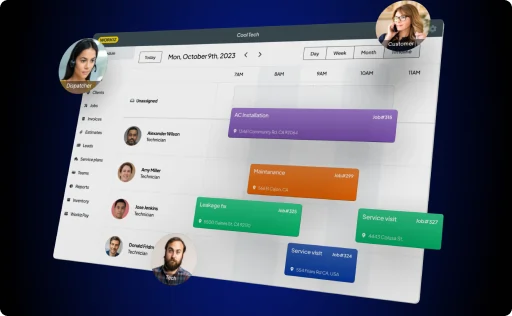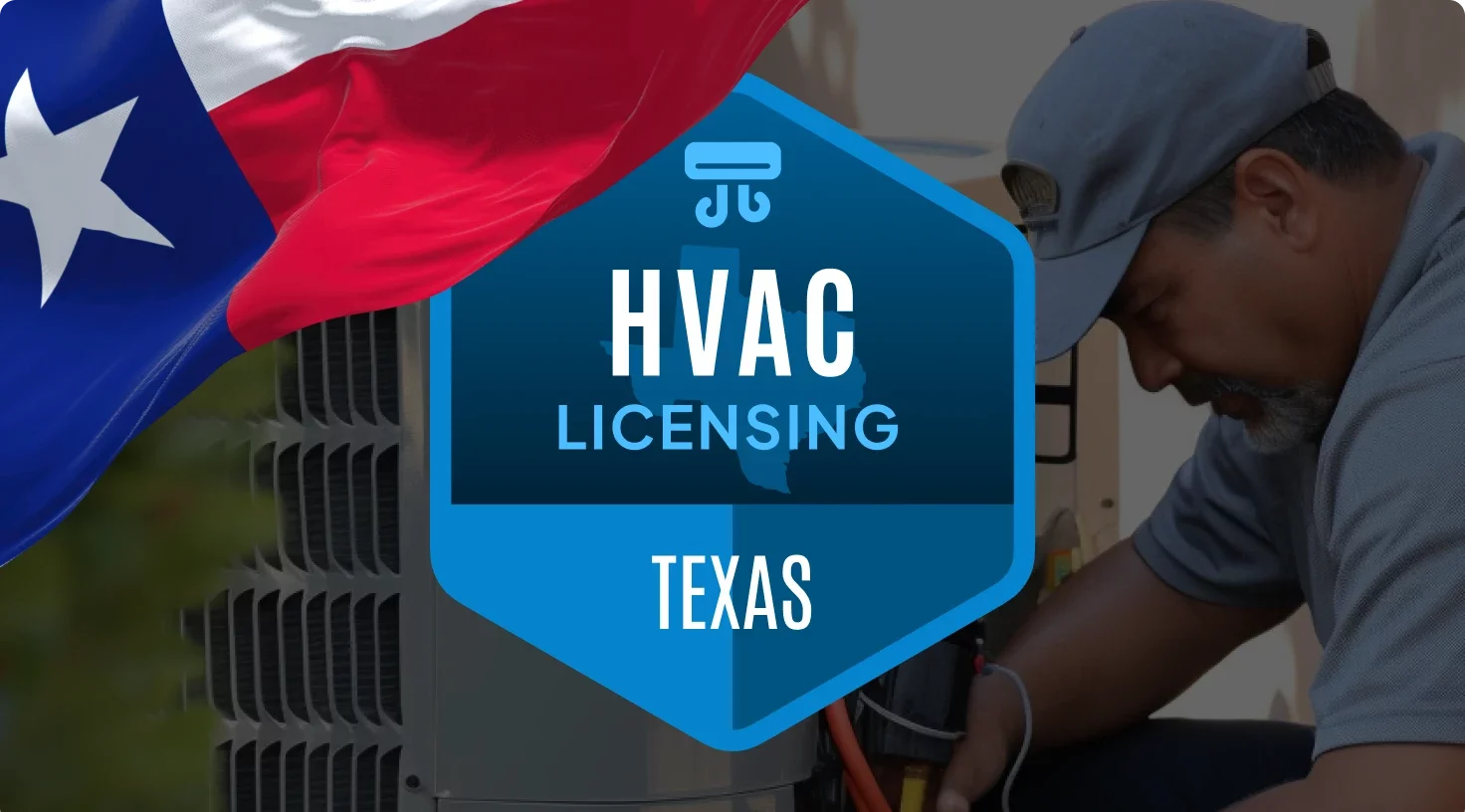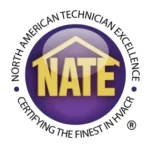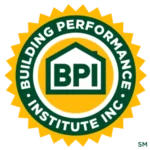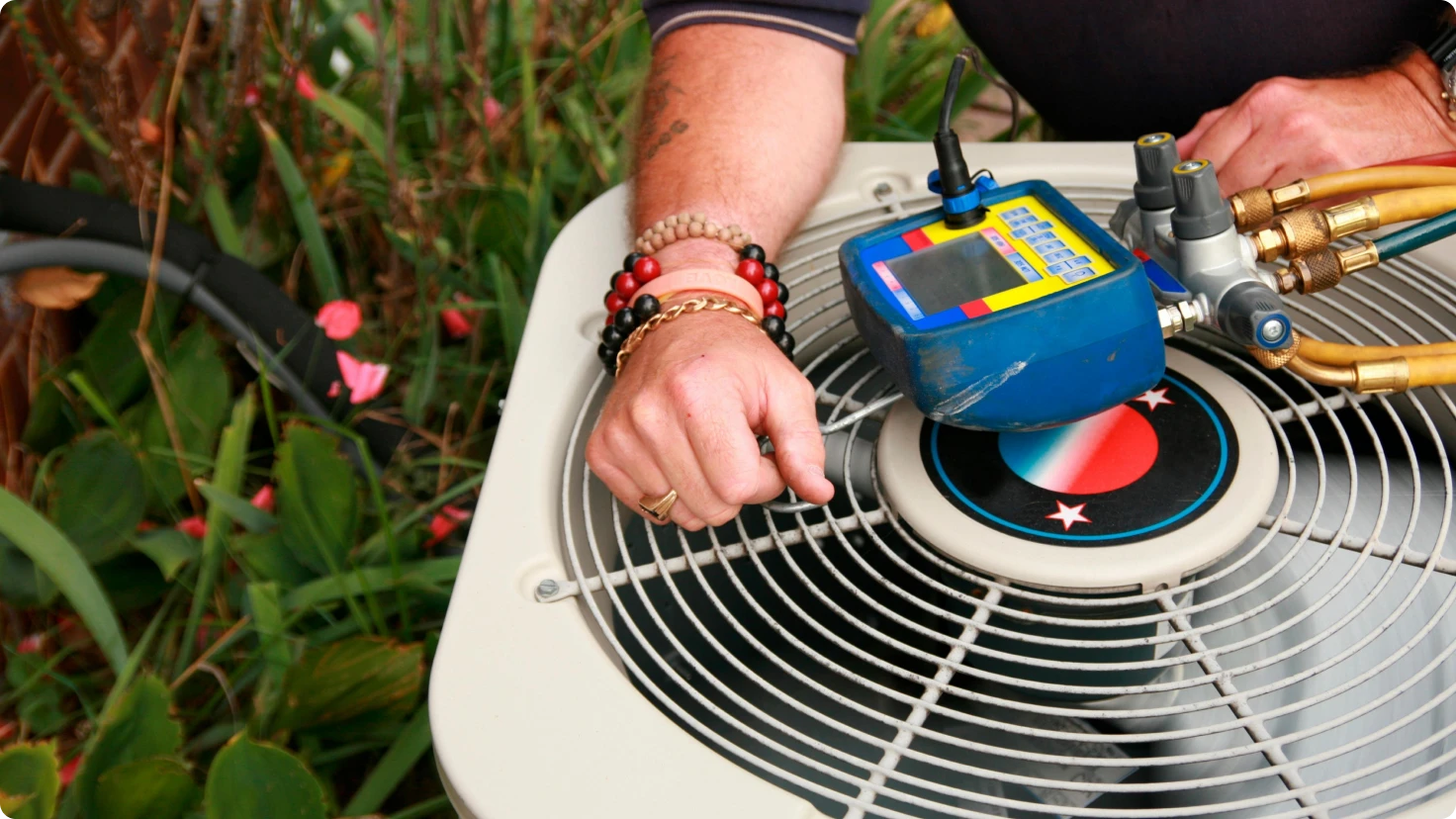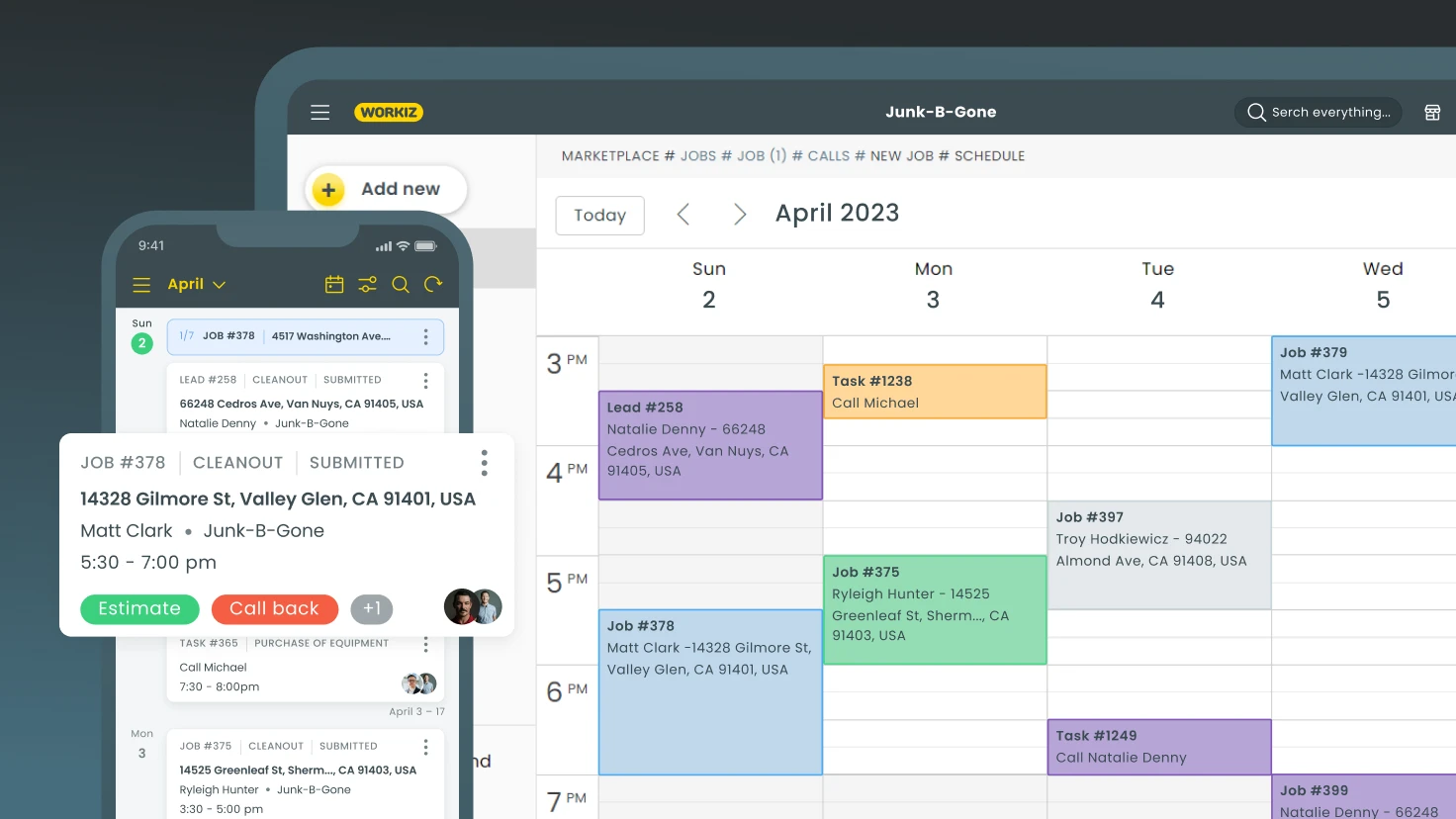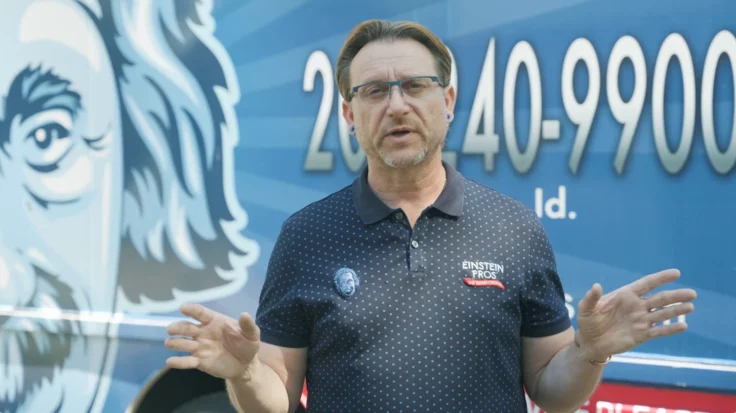Licensing requirements
In Texas, HVAC contractors are required to hold a state license issued by the Texas Department of Licensing and Regulation (TDLR). The licensing process involves meeting certain qualifications, passing an exam, and adhering to specific regulations.
HVAC certifications
Several certifications are recognized nationwide and can enhance your career prospects as an HVAC professional in Texas. These certifications include:
NATE Certification (North American Technician Excellence)
NATE Certification, also known as the North American Technician Excellence certification, is a nationally recognized credential for HVAC professionals Although not mandatory, NATE certification is highly recommended. It is based on an exam and signifies a higher level of expertise, leading to better job opportunities and potentially higher earnings. NATE certifications are recognized throughout the United States and Canada.
Being able to successfully pass the NATE exam demonstrates your competence and expertise in the HVAC and refrigeration industry. NATE certified technicians often enjoy higher earning potential and longer careers in the field and this makes it a valuable qualification for both new and experienced HVAC professionals.
We’ve discovered that employers in Texas often prioritize hiring technicians who hold NATE Certifications due to the rigorous nature of the exams and the recognition that comes with the certification. So having a NATE Certification is not only imperative but can also make you a more competitive candidate for HVAC job positions in Texas.
It demonstrates your commitment to high industry standards and continuous learning. This credibility can help you earn the trust of clients and employers in Texas.
EPA 608 Certification (Environmental Protection Agency)
Required by the federal government, this certification is mandatory for technicians who handle refrigerants. It is divided into four types, based on the type of equipment handled, and ensures technicians are trained in handling refrigerants safely.
It is required for HVAC technicians and professionals who work with refrigerants in various heating, ventilation, air conditioning, and refrigeration (HVACR) systems.
It is imperative for HVAC professionals to obtain the appropriate EPA 608 certification to comply with environmental regulations and ensure the proper handling of refrigerants in their work.
In Texas, as in all other states, the EPA 608 Certification is essential for technicians who handle ,service, maintain, or repair equipment that contains regulated refrigerants. This certification ensures that technicians are knowledgeable about proper refrigerant handling, storage, and disposal, as well as leak detection, recovery, and recycling procedures.
The EPA 608 Certification is divided into four different types, each corresponding to the different types of HVACR systems and the refrigerants they use:
- Type I Certification: This certification is required for technicians who work with small appliances containing five pounds or less of refrigerant. Examples of equipment covered under Type I include household refrigerators, window air conditioners, and vending machines.
- Type II Certification: Technicians who work with high-pressure systems, including residential and commercial air conditioning systems, heat pumps, and packaged terminal air conditioners (PTACs), must obtain Type II Certification.
- Type III Certification: This certification is necessary for technicians who service or repair low-pressure systems, such as chillers or industrial process refrigeration systems.
- Universal Certification: Universal Certification covers all three types mentioned above and is recommended for technicians who work with a wide range of HVACR systems and refrigerants. It allows technicians to handle and service all types of equipment, regardless of the refrigerant involved.
To obtain the EPA 608 Certification in Texas, technicians must pass a written exam administered by an approved certifying organization. The exam typically covers topics such as ozone depletion, refrigerant types, handling procedures, leak detection, recovery, and safety practices.
BPI Certifications
The Building Performance Institute (BPI) provides certifications related to energy efficiency and building performance. While not exclusive to HVAC, these certifications can be valuable for HVAC professionals especially if you’re someone who prefers to work on energy-efficient HVAC systems, home energy audits, and weatherization projects.
Here are some key BPI certifications:
- Building Analyst Professional (BPI BA): This certification covers a wide range of building performance assessments, including evaluating insulation, air leakage, ventilation, and combustion safety. BPI BA professionals are trained to identify energy efficiency issues and recommend improvements to optimize building performance.
- Heating Professional (BPI Heating): BPI Heating certification focuses on assessing and improving the performance of heating systems. HVAC professionals with this certification have the knowledge and skills to evaluate heating system efficiency, combustion safety, and proper equipment sizing.
- Air Conditioning and Heat Pump Professional (BPI AC/HP): BPI AC/HP certification is specifically designed for HVAC professionals working with air conditioning and heat pump systems. It covers areas such as system installation, maintenance, diagnostics, and refrigerant handling. This certification ensures that technicians are proficient in optimizing the performance and energy efficiency of cooling systems.
Manufacturer-Specific Certifications:
Many HVAC equipment manufacturers offer their own certifications to ensure that technicians are trained and qualified to work on their specific products. These certifications demonstrate a technician’s expertise in installing, maintaining, and servicing the manufacturer’s equipment. Here are some examples:
- Carrier Factory Authorized Dealer: Carrier offers certifications to HVAC professionals who meet their stringent requirements and training standards. These certifications validate technicians’ knowledge of Carrier products and their ability to provide exceptional service.
- Trane Comfort Specialist: Trane provides certifications for HVAC professionals who meet their criteria for technical expertise and customer satisfaction. Trane bComfort Specialists are trained to install, maintain, and repair Trane heating and cooling systems.
- Lennox Premier Dealer: Lennox offers certifications to HVAC professionals who demonstrate proficiency in installing and servicing Lennox equipment. Lennox Premier Dealers have access to specialized training and resources to ensure high-quality service.
- Daikin Comfort Pro: Daikin Comfort Pro certification is granted to HVAC professionals who meet Daikin’s standards of excellence. It signifies a technician’s expertise in installing and maintaining Daikin heating and cooling systems.
Manufacturer-specific certifications allow technicians to specialize in specific brands, giving them an advantage when working with those particular products. These certifications often come with additional benefits, such as access to exclusive technical support, training programs, and warranty services.
HVAC licenses in Texas
The Texas Department of Licensing and Regulation issues several types of HVAC licenses. However, as a prospective HVAC technician there are mainly two types of HVAC license in Texas; Class A HVAC license and Class B HVAC license . Each license has its functions and advantages depending on the area you wish to specialize in.
Here’s a further explanation of each type:
- Class A License: A Class A HVAC license in Texas allows contractors to work on all types and sizes of HVAC systems without any restrictions. Holders of a Class A license can service, install, repair, and maintain a wide range of HVAC equipment, including both residential and commercial systems. Contractors with a Class A license have the flexibility to work on HVAC systems of any capacity, from small residential units to large-scale commercial or industrial systems.
- Class B License: A Class B HVAC license in Texas restricts the activities of contractors to cooling and heating systems that meet specific size or energy requirements. Typically, Class B license holders are authorized to work on HVAC systems up to a certain capacity or energy output. This license is often suitable for contractors who primarily focus on residential HVAC systems or smaller-scale commercial systems. Contractors with a Class B license may have limitations on the size, complexity, or type of HVAC equipment they can handle.
- Class C Air Conditioning and Refrigeration Contractor: Limits your work to systems that are 5 tons of cooling or heating and 1 ton of refrigeration or less.
- Class D Air Conditioning and Refrigeration Contractor: Limits your work to residential structures only.
How to get an HVAC license
Here are some steps that’ll help you get an HVAC license in no time.
- Ensure you qualify for the eligibility requirements set by the Texas Department of Licensing and Regulation (TDLR).
- Complete the required education and training in HVAC systems and technologies.
- Gain practical work experience in the HVAC field.
- Prepare and study for any required licensing exams.
- Submit an application for the HVAC license to the TDLR.
- Pay the necessary application and licensing fees.
- Provide documentation, such as proof of education, work experience, and any relevant certifications.
- Schedule and pass the licensing exams, if applicable.
- Fulfill any additional requirements specific to your license type or jurisdiction.
- Obtain liability insurance and any other required insurance coverage.
HVAC License by state
- HVAC license California
- HVAC license Florida
- HVAC license Georgia
- HVAC license Illinois
- HVAC license New York
- HVAC license Ohio
- HVAC license Pennsylvania
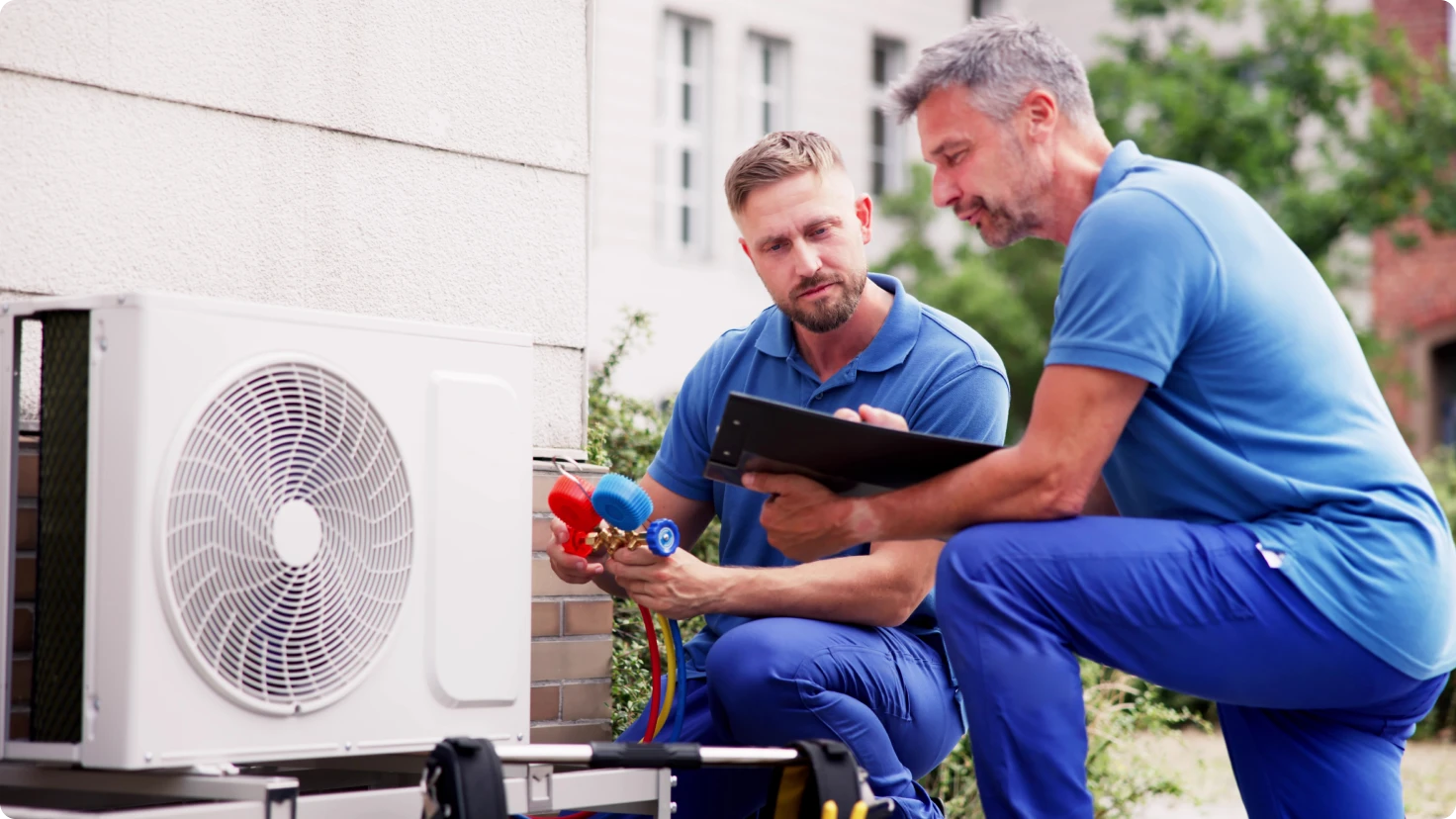
Becoming a licensed HVAC professional in Texas
Becoming a licensed HVAC professional in Texas involves several steps, including education, training, and certification. Here are the steps you need to follow to pursue a career in HVAC and obtain a license in Texas:
- Meet Educational Requirements: Obtain a high school diploma or GED. Having a basic education is essential for any career path, including HVAC.
- Choose an HVAC Training Program: Enroll in a reputable HVAC training program. There are various options in Texas, including trade schools, community colleges, and technical institutes that offer HVAC courses. Look for programs that provide hands-on training and cover essential topics such as electrical systems, heating systems, cooling systems, refrigeration, and HVAC design.
- Complete HVAC Training: Successfully complete the HVAC training program you have chosen. This will provide you with the knowledge and skills required to work in the HVAC industry.
- Gain Work Experience: While not always mandatory, gaining practical work experience in the HVAC field is invaluable. Many HVAC professionals start as apprentices or entry-level technicians to learn from experienced mentors.
- Obtain EPA 608 Certification: As mentioned earlier, the EPA 608 Certification is mandatory for HVAC technicians who work with refrigerants. Pass the EPA 608 exam for the specific type of certification you need (Type I, II, III, or Universal).
- Familiarize Yourself with State Regulations: Familiarize yourself with the licensing regulations in Texas. Licensing requirements may vary by city or county, so make sure to check the specific requirements in the area where you intend to work.
- Decide on the Type of HVAC License: Texas often has different levels of HVAC licenses or specialized licenses based on the type of work you want to perform. So you need to determine the specific type of HVAC license you need based on your career goals and the scope of work you want to undertake.
- Meet Additional Licensing Requirements: In addition to the EPA 608 Certification, you may need to meet other requirements such as passing a state licensing exam, providing proof of work experience, and submitting a license application.
- Apply for HVAC License: Submit your application for an HVAC license to the relevant licensing authority in Texas. Ensure that all required documents and fees are included with your application.
- Prepare for the Licensing Exam: If a licensing exam is required, prepare thoroughly for it. Study relevant HVAC topics, building codes, regulations, and safety practices. The exam may test your knowledge of HVAC systems, installation, repair, safety protocols, and local regulations.
- Secure Liability Insurance: As a licensed HVAC professional in Texas, you may be required to have liability insurance. Even if it’s not mandatory, having insurance protects you and your clients in case of accidents or damages.
- Begin Your HVAC Career: Once you have met all the requirements and obtained your HVAC license in Texas, you are ready to start your career as a licensed HVAC professional. Consider joining professional organizations and seeking employment opportunities with reputable HVAC companies or start your own HVAC business. If you are interested in building your own HVAC business consider getting an HVAC software to manage and automate your entire business all in one place.
Benefits of Getting an HVAC License
Obtaining an HVAC license in Texas offers several advantages for professionals in the field. Here are some key advantages:
- Enhanced Professional Credibility: Holding a valid HVAC license demonstrates your commitment to professionalism and competence in the industry. It gives customers and employers confidence in your skills and knowledge, making you more credible as a service provider or employee.
- Expanded Job Opportunities: Many HVAC companies and employers require technicians to hold a valid license. By obtaining an HVAC license, you become eligible for a wider range of job opportunities. Licensed professionals often have an edge over non-licensed individuals when it comes to securing employment or advancing their careers.
- Increased Earning Potential: Licensed HVAC technicians generally command higher wages compared to their non-licensed counterparts. The specialized skills and knowledge gained through licensing can justify higher pay rates. Additionally, some employers offer salary incentives or bonuses to licensed technicians as a recognition of their qualifications.
- Legal Compliance: In Texas, HVAC licensing is regulated by the Texas Department of Licensing and Regulation (TDLR). When you obtain a license, you ensure compliance with state regulations and avoid potential legal issues or penalties associated with working without the required credentials. Operating as an unlicensed HVAC technician can lead to fines and even the suspension of your right to work in the field.
- Ability to Work Independently: Holding an HVAC license may provide you with the opportunity to start your own HVAC business or work as a self-employed contractor. Having a license demonstrates your expertise and can attract more customers who prefer working with licensed professionals.
HVAC schools and training programs in Texas
When it comes to finding the right HVAC school, it’s essential to consider various factors that align with your individual needs and aspirations. While we cannot determine what will best suit you, conducting thorough research on each school’s programs and reading reviews from students and industry professionals can serve as the initial step on your journey towards obtaining an HVAC license.
By evaluating the curriculum, faculty expertise, hands-on training opportunities, and the school’s reputation, you can gain valuable insights into the quality of education and the potential for success in the field. Ultimately, choosing the best HVAC school is a personal decision that requires careful consideration of your goals, resources, and learning preferences.
Ready to kickstart your HVAC career? here are some accredited HVAC training programs in Texas:
- Lamson Institute, San Antonio, Texas 78238
- Texas State Technical College, Waco, TX
- Tech Zone HVAC School, Irving TX
- El Paso Community College, El Paso
- The Training Center Of Air Conditioning & Heating, Houston, Texas
- Dallas College, Dallas, TX
- Central Texas AC & Refrigeration School, Austin, TX
- Houston Trade Training LLC, Houston, TX
- ETT Excellent Trade Training of HVAC, Houston, TX
- National Technical Institute, Houston, TX
Training Programs
- Certified HVAC Technician
- Certified Plumbing Technician
- Certified Electrical Technician
FAQs about HVAC licensing in Texas
Here are some frequently asked questions about the HVAC licensing process in the state of Texas.
What certifications are required in Texas for HVAC professionals?
In Texas, one of the essential certifications for HVAC professionals is the Environmental Protection Agency (EPA) 608 Certification. This certification is mandated by the federal government and ensures that HVAC technicians are competent in handling refrigerants. The EPA 608 Certification is divided into four types:
- Type I Certification: This certification allows technicians to work on and handle small appliances, such as domestic refrigerators, window air conditioning units, and vending machines.
- Type II Certification: With Type II Certification, technicians can service, install, and dispose of high-pressure refrigerant-containing equipment, including residential air conditioning units, heat pumps, process refrigeration, and commercial refrigeration.
- Type III Certification: Type III Certification qualifies technicians to work with and dispose of equipment and appliances that contain low-pressure refrigerants commonly found in industrial applications.
- Universal Certification: Universal Certification covers all types of equipment and refrigerants. Technicians with Universal Certification can work on and handle equipment of any kind, regardless of the refrigerant type.
How long does it take to become an HVAC technician in Texas?
The time it takes to become an HVAC technician in Texas can vary depending on several factors, including the educational path you choose and whether you pursue additional certifications. Here is a general breakdown of the different paths and their estimated timelines:
- Trade School or Community College Program: Enrolling in an HVAC training program at a trade school or community college can provide comprehensive instruction and hands-on training. These programs typically range from six months to two years in duration, depending on whether you pursue a certificate, diploma, or associate degree. The programs cover various aspects of HVAC, including heating, ventilation, air conditioning, refrigeration, electrical systems, and troubleshooting.
- Certificate Program: A certificate program can typically be completed in six months to one year, focusing on core HVAC skills and knowledge.
- Diploma Program: Diploma programs may last one to two years and provide more in-depth training, including additional coursework in HVAC theory, system design, and advanced troubleshooting.
- Associate Degree Program: An associate degree program generally takes two years to complete and offers a broader education, including general education courses alongside HVAC-specific training.
- Apprenticeship Program: Another pathway to becoming an HVAC technician is through an apprenticeship program. Apprenticeships combine on-the-job training with classroom instruction. The duration of an apprenticeship can vary, typically ranging from two to five years. During this time, you work under the guidance of experienced HVAC professionals, gaining practical experience and gradually increasing your skills. Apprenticeship programs may have specific hourly requirements for on-the-job training, typically totaling around 2,000 to 8,000 hours, depending on the program and state requirements.
- On-the-Job Training: Some individuals enter the HVAC field through on-the-job training, starting as entry-level helpers or assistants. In this case, the timeline for becoming a fully skilled HVAC technician can vary significantly. It generally takes several years of practical experience, combined with self-study and ongoing training, to gain the necessary knowledge and skills to work independently as an HVAC technician.
Are there reciprocity agreements for HVAC licenses in Texas?
Texas does not have statewide reciprocity agreements for HVAC licenses. However, the TDLR may consider your previous experience and credentials when reviewing your license application.
What are useful tools to use in my HVAC business?
Running a successful HVAC business in Texas requires not only technical expertise but also the right tools and equipment to ensure efficient operations. Here are some useful tools commonly used in the HVAC industry:
HVAC Diagnostic Tools
- Digital Multimeter: Essential for measuring voltage, current, and resistance in electrical circuits.
- Manifold Gauge Set: Used to measure and monitor refrigerant pressures in HVAC systems.
- Thermometer: Helps measure temperatures and identify temperature differentials within HVAC components.
- Leak Detectors: Used to locate refrigerant leaks in HVAC systems, helping with repair and maintenance.
Refrigerant Recovery and Recycling Equipment:
- Refrigerant Recovery Machine: Essential for safely recovering and recycling refrigerants during HVAC system servicing or replacement.
- Refrigerant Scale: Used to accurately measure the amount of refrigerant being recovered or added to HVAC systems.
Hand Tools
- Screwdrivers, Pliers, and Wrenches: Basic hand tools for various tasks, such as loosening or tightening electrical connections, fasteners, and valves.
- Tubing Cutters and Flaring Tools: Necessary for cutting and shaping copper tubing during installation or repair work.
- Pipe Threaders and Pipe Cutters: Used to thread and cut pipes for proper fitting and connection.
HVAC System Testing and Balancing Tools
- Airflow Meters: Help measure and balance airflow in HVAC systems to ensure proper performance and efficiency.
- Ductwork Insulation Tester: Measures insulation levels in ductwork to identify potential energy losses and efficiency issues.
- Air Quality Monitors: Used to test and monitor indoor air quality, including humidity, temperature, and levels of contaminants.
Software and Technology
- HVAC Estimating and Quoting Software: Helps generate accurate and professional estimates for HVAC projects.
- Customer Relationship Management (CRM) Software: Assists in managing customer information, scheduling appointments, and tracking service history.
- HVAC System Design Software: Useful for designing and modeling HVAC systems for new installations or upgrades.
Safety Equipment
- Personal Protective Equipment (PPE): Includes items like safety goggles, gloves, and respiratory protection to ensure your safety during HVAC installations and repairs.
- Gas and Carbon Monoxide Detectors: Essential for detecting gas leaks and carbon monoxide presence, ensuring safety for both technicians and occupants.
Using a comprehensive field management software tool, such as Workiz, encompasses the functionalities we’ve discussed which includes scheduling, dispatching, job management, and customer communication. With a range of additional useful features, Workiz is an ideal solution for HVAC professionals at any stage of their careers.
As you embark on your journey to become a licensed HVAC professional in Texas, remember that success in this field requires both technical expertise and business acumen. Whether you’re just starting out or expanding your existing business, investing in quality HVAC software can streamline your operations, improve customer service, and boost your bottom line. From scheduling appointments and managing inventory to tracking maintenance histories and generating invoices, the right HVAC software can help you stay competitive in Texas’s dynamic HVAC market. By combining your technical skills, proper licensing, and modern business tools, you’ll be well-equipped to thrive in this rewarding industry.
